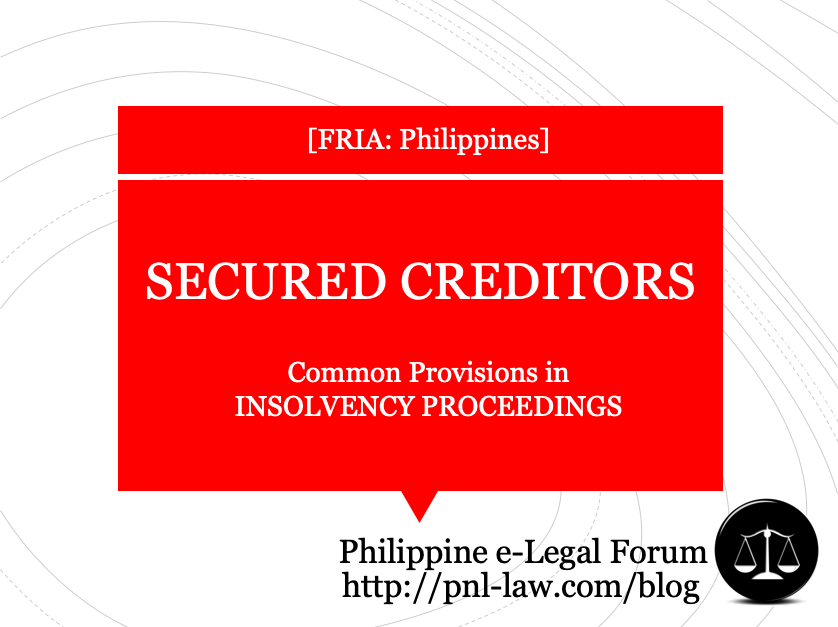A “secured creditor” refers to s creditor with a secured claim. The Liquidation Order shall not affect the right of a secured creditor to enforce his lien in accordance with the applicable contract or law, unless he waives his right. The provisions cited/discussed below are from Republic Act No. 10142, also known as the “Financial Rehabilitation and Insolvency Act (FRIA) of 2010,“ as fleshed out in the FLSP Rules. These common provisions apply to liquidation of juridical debtors, and voluntary/involuntary liquidation of individual debtors.

DUTY OF SECURED CREDITORS
At any time prior to the election of the liquidator, a secured creditor shall manifest in writing to the court whether he is:
- (a) waiving his right under the security or lien in accordance with Section 6 of this Rule; or
- (b) maintaining his right under the security or lien.
If a secured creditor fails to file such a manifestation, he shall be deemed to have opted to maintain his right under the security or lien.
WAIVER OF SECURITY OR LIEN
A secured creditor shall not be deemed to have waived his right under the security or lien unless the waiver is made in a public document, in unequivocal language, and with full knowledge of the consequences of his action. If a secured creditor waives his right, he shall be entitled to participate in the liquidation proceedings as an unsecured creditor.
WHEN A SECURED CREDITOR MAINTAINS HIS SECURITY OR LIEN
If a secured creditor elects to enforce or maintain his right under the security or lien, at his option:
(a) the value of the property may be fixed in a manner agreed upon by the creditor and the liquidator, and approved by the court.
When the value of the property is less than the claim it secures, the liquidator may convey the property to the secured creditor and the latter will be admitted in the liquidation proceedings as an unsecured creditor for the balance. If the value of the property exceeds the claim secured, the liquidator may convey the property to the secured creditor and waive the debtor’s right of redemption upon receiving the excess from the creditor. In any case, any other creditor or interested party may, upon a prima facie showing that the valuation is too low, contest the valuation and propose another mode by which to dispose of the property, or to otherwise convert it to cash or its equivalent, to ensure that the true maximum value of the property under the circumstances is obtained. A dissenting creditor or any other creditor or interested party may also offer to purchase the property at the price it is valued by the secured creditor and the liquidator, as approved by the court. At all times, it shall be the duty of the court to ensure that the property is valued at its maximum under the circumstances. In case there is conflict on the valuation of the property, the court may appoint an independent third party appraiser to assist in determining the proper valuation of the property;
(b) the liquidator may sell the property and satisfy the secured creditor’s entire claim from the proceeds of the sale. The sale shall be made under such terms and conditions as the liquidator and the secured creditor may agree upon, as approved by the court, provided, that the costs of the sale, if any, shall be for the account of the secured creditor; or
(c) the secured creditor may enforce the lien or foreclose on the property pursuant to applicable laws.
| Other common provisions: * Liquidator * Liquidation order | * Determination of claims * Avoidance proceedings * Liquidation plan |
- Extension of Filing Periods and Suspension of Hearings for March 29 to April 4, 2021: SC Administrative Circular No. 14-2021 (Full Text) - March 28, 2021
- ECQ Bubble for NCR, Bulacan, Cavite, Laguna and Rizal: Resolution No. 106-A (Full Text) - March 27, 2021
- Guidelines on the Administration of COVID-19 Vaccines in the Workplaces (Labor Advisory No. 3) - March 12, 2021
